Cohort 3
 Yanghao Wu
Yanghao Wu
University: University of Bristol
Supervisors: Prof Paul Wilcox and Prof Anthony Croxford
PhD Project: Generic Small Robot for Replacing Manual Ultrasonic Inspection Tasks
The aim of this project is to develop techniques using generic robots to automate some standard Ultrasonic Non-Destructive Evaluation Measurements. The most potential application is to detect fatigue cracks at fastener holes of aircraft metallic components. In this project, both 1D and 2D ultrasound array will be used to characterize the different potential defects. Also different imaging method will be investigated. Finally the most optimized probes and imaging methods will be selected for the automatic detection based on simulation and experiment.
Matthew Riding
University: University of Strathclyde
Supervisor: Dr Theodosia Stratoudaki and Dr Charles MacLeod
PhD Project: Novel Schemes of Laser Ultrasound Deployment and Data Analysis to Solve Industrially Relevant NDE Challenges
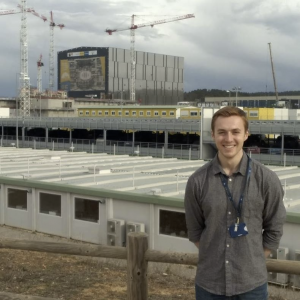 Laboratory experiments with laser ultrasonic testing (laser UT) have demonstrated the ability to detect and characterise manufactured defects within solid components in fully non-contact schemes. Demonstrations of advanced laser UT techniques, such as laser-induced phased array inspection, have until now mostly been performed on simple samples with favourable acoustic properties and exaggerated, artificial defects. Whilst such simple test samples are ideal for experiments focussing on fundamental technique development, a wider range of sample materials, geometries, defects and inspection problems must be explored in order for advanced laser UT techniques to mature further. This project therefore aims to perform advanced laser UT experiments on novel samples, identify issues limiting the information obtained and then apply novel approaches to both experimental configuration and data analysis to demonstrate the applicability of this technology to industrially relevant NDE challenges.
Laboratory experiments with laser ultrasonic testing (laser UT) have demonstrated the ability to detect and characterise manufactured defects within solid components in fully non-contact schemes. Demonstrations of advanced laser UT techniques, such as laser-induced phased array inspection, have until now mostly been performed on simple samples with favourable acoustic properties and exaggerated, artificial defects. Whilst such simple test samples are ideal for experiments focussing on fundamental technique development, a wider range of sample materials, geometries, defects and inspection problems must be explored in order for advanced laser UT techniques to mature further. This project therefore aims to perform advanced laser UT experiments on novel samples, identify issues limiting the information obtained and then apply novel approaches to both experimental configuration and data analysis to demonstrate the applicability of this technology to industrially relevant NDE challenges.
Gala Dalgety
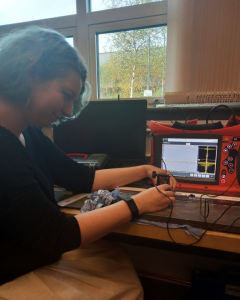 University: University of Warwick
University: University of Warwick
Supervisor: Dr Rachel Edwards
PhD Project: Automated Implementation of EMAT Inspection
This project essentially looks into the intelligent operation of robots with non-destructive testing (NDT) capabilities. This will include building on previous developments in making miniaturised electromagnetic acoustic transducers (EMATs) capable of generating and detecting shear horizontal (SH) waves. Advantages of this include improving spatial resolution, and making implementation onto a robotic platform simpler, particularly for inspection of ferritic steel. However, the signal to noise ratio (SNR) of these techniques are smaller than other ultrasonic alternatives and it will be essential to explore how to improve signal analysis. One of the ways to improve SNR will be to look into focusing and phasing the SH waves and taking advantage of any directivity the EMATs have. Other solutions to improve SNR to be explored include utilising other wavemodes and sensing techniques and performing data fusion, looking at robot scanning techniques to give high probablilities of defect detection, and the use of multiple scans to find if there is a defect in the area and then rescan the areas with a high probability of a defect.
Martha Turvey
 University: University of Warwick
University: University of Warwick
Supervisor: Dr Rachel Edwards
PhD Project: Liquid Crystal Sensors for Ultrasound Detection
Liquid crystals can be used to make a passive detection sensor for ultrasound, providing a visual image of the propagation of ultrasound through the sample. Demonstration of the sensor has focused on analysis of the resonant modes of a piezoelectric transducer, and visualisation of longitudinal waves passing through a sample. Although the technology is at a low technology readiness level (TRL), several potential avenues are ready for exploitation. This project will identify the key areas for development, look at potential applications, and develop the sensors such that they can be used for non-destructive testing (NDT).
Shaun McKnight
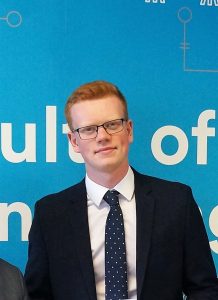
University: Strathclyde
Supervisor: Prof Gareth Pierce
Sponsor: Spirit Aerosystems
PhD Project: Machine Learning for NDE Inspection
Ultrasonic NDT methods are critical in the testing process of manufacturing for composite aerospace components. There are ambitions to automate this process, however the requirement for manual interpretation of NDT results remains a bottleneck in the testing. My project aims to address this challenge by developing Machine Learning algorithms to allow for automatic interpretation of results. This project hopes to integrate with other non-destructive testing projects with the overall aim of automating the complete testing process.
Martin McInnes
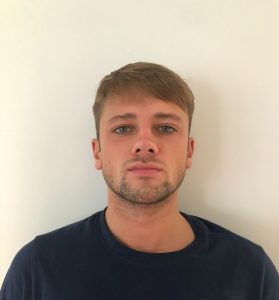
University: Strathclyde
Supervisor: Dr Ehsan Mohseni
Sponsor: Spirit Aerosystems
PhD Project: Automated In-Process Inspection of Additively Manufactured Components Using Ultrasonic Testing and Eddy Currents
The aim is to automate eddy currents and ultrasonic testing using industrial robots. Throughout the project, the plan is to simulate, design and build electromagnetic and ultrasonic sensors in which they will be integrated with automated systems and their performance evaluated through the inspection of aeroplane composite materials.
Lily Tu

University: Bristol
Supervisor: Prof Paul Wilcox
PhD Project: Laser Induced 2D Phased Array for Composite Material Inspection
Laser induced phased arrays (LIPAs) have several advantages over traditional piezoelectric ultrasound arrays in terms of their non-contact, couplant free nature, and their ability to change array geometry during an inspection as the element positions are not fixed. The proposed research will design a 2D LIPA for inspection of defects in composite materials using simulated data and implement the array design in experiments. The successful outcome of the research will demonstrate the suitability of using LIPA as 2D array in improving defect inspection and characterisation in composite material.
Laurence Clarkson

University: Imperial
Supervisor: Dr Frederic Celga
PhD Project : Estimation of Internal Pipe Wall Temperature
There is concern that rapid temperature changes in the primary cooling circuit of reactors can induce thermal fatigue that can be detrimental to the overall life of components in the primary circuit. It is therefore desirable to monitor the number and magnitude of cross wall temperature changes in these components so that one can better estimate the magnitude and number of stress cycles that a component experience to predict the overall life of the components. This project aims to build on the outcomes of a recent feasibility study to enable real-time monitoring of temperature wall gradients in primary circuit components under realistic conditions (up to 350°C).
Andre Lello
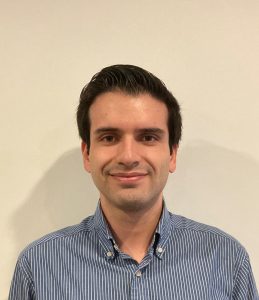 University: Imperial
University: Imperial
Supervisors: Dr Bo Lan and Prof Mike Lowe
PhD Project: Characterisation Grain Microstructures in Metals Using Ultrasound
This project aims to characterise critical microstructures within engineering metals using ultrasound. Most metals are polycrystalline, and their critical performances are determined by the grain microstructures. The NDE group at Imperial College has developed a breakthrough methodology to extract volumetric texture from the speeds of compressional ultrasound. It has been validated on a conventional water-bath system, which, in addition, has produced experimental evidences that the shear waves propagating through a metal sample are strongly affected by the microstructures. The amplitudes of the shear waves correlate with the grain sizes in the propagation direction, and they vary significantly when the waves propagate in different directions in 3D, which indicates the exciting possibility to simultaneously evaluate the texture and the volumetric morphologies of the microstructures non-destructively from the same ultrasound setup. This doctorate project aims to understand the physics of the wave behaviours and develop the method for industrial application.
Alex Towlson
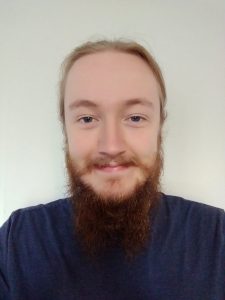
University: Bristol
Supervisors: Prof Anthony Croxford and Prof Bruce Drinkwater
PhD Project: Robotic Pipe Inspection with Ultrasonic Sensor Arrays
The aim of this project is to develop an ultrasonic sensor system and associated data analysis tools to extract information from the interior of a buried pipes, to detect and characterise defects such as cracks and corrosion. Such a system is required to operate in a variety of conditions, including pressurized and partially filled pipes with flow. In order to be easily deployed, it is important for the device to be compact and energy efficient, so that it can be mounted on-board an autonomous robot.
Jun Li
University: Bristol
Supervisors: Dr Jie Zhang and Prof Paul Wilcox
PhD Project: Low-Cost Laser Ultrasonic Arrays for the Inspection of Safety Critical Components
Ahmed Al Fuwaires
University: Strathclyde
Supervisor: Dr Theodosia Stratoudaki
PhD Project: Optoacoustic (Laser Ultrasound) Sensing for Remote, Chemical Process Monitoring
